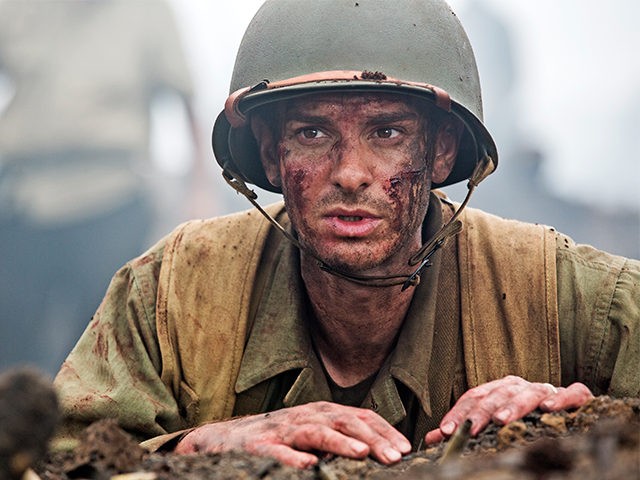Nobody films violence quite like Mel Gibson.
Gibson’s first directorial effort in a decade, Hacksaw Ridge, is rated R for “intense prolonged realistically graphic sequences of war violence including grisly bloody images,” warns the MPAA. And the film certainly earns every bit of that rating, which seems odd for a film about a pacifist.
Andrew Garfield (The Amazing Spider-Man, The Social Network) is Desmond Doss, a conscientious objector who was awarded the Medal of Honor for his courage under fire during 1945’s Battle of Okinawa. What makes his story so unique is that due to his Seventh Day Adventist faith, Doss did not believe in killing and would not touch guns, even under the extraordinary circumstances of war. Armed with only a small Bible and his prayers, Doss ventured into the hellfire of war and saved the lives of approximately 75 of his fellow soldiers.
Hacksaw Ridge essentially fits two movies into its 131-minute runtime, not unlike Stanley Kubrick’s masterpiece Full Metal Jacket. There’s the before-the-war first half, which centers on Doss’s turbulent upbringing under his abusive father Tom (Hugo Weaving), himself a veteran of the Great War, and his budding relationship with a nurse, Dorothy Schutte (Teresa Palmer), whom he meets after saving a young man’s life and accompanying him to the local hospital.
The early scenes of Desmond’s courtship of Dorothy are almost gratingly saccharine and squeaky-clean, but soon our young protagonist is off to join the military, following the lead of his brother Harold (Nathaniel Buzolic), after first asking Dorothy to marry him. The young nurse gives Doss a pocket Bible and a small photograph of herself, and then he’s on the bus to basic training, with no clue of the hardship and horror he is shortly to face.
The film picks up quickly at boot camp, where Doss’ faith and his refusal to train with a rifle quickly ruffle the feathers of his fellow would-be soldiers and his superiors. Vince Vaughn steals every scene he is in as tough-talking, insult-spewing Sgt. Howell, who comes under tremendous pressure from Cpt. Glover (Sam Worthington) to get the holier-than-thou Christian do-gooder off of his base. When good old-fashioned hazing and an attempt to get Doss branded a psychiatric liability prove unsuccessful, a legal battle ensues as Col. Sangston (Robert Morgan) slaps Doss with a court-martial for refusing to comply with direct orders. Throughout it all, Doss repeatedly turns to God for answers.
Needless to say, Doss is finally allowed to train as a combat medic and is soon on his way to what would become one of the bloodiest battles of World War II. Here, Gibson is at the top of his game. The last hour of the film plays more like a horror film than a war drama, and Gibson’s depiction of the hellish insanity of war has not been equaled onscreen since perhaps 1998’s Saving Private Ryan.
Through the haze of exploding limbs, raining blood, slicing bayonets and the booms of machine-gun fire, Doss does his work patiently and efficiently. Gibson directs the bloody melee unflinchingly but without reveling in the carnage, even as soldiers like Smitty (Luke Bracey) come up with increasingly creative methods to stay alive, including using the corpse of a fallen comrade as a human shield.
Like all war films about real-life subjects, Hacksaw Ridge sometimes veers into hagiographic territory. The film’s unabashed patriotism and earnest religious themes will undoubtedly piss off perpetually jaded atheists. But one of the film’s key features is that, much like its protagonist, it refrains from making moral judgements on the soldiers, their motivations, the war and the power of religious conviction.
Of course, Gibson brings his own baggage to the film. His last stint in the director’s chair was for Apocalypto all the way back in 2006, the same year in which he was recorded shouting anti-Semitic remarks at a police officer after being busted for drunk driving. Whether one can separate the man from his work is up to the individual viewer, and would be the subject of an entirely different article.
What is clear is that in the intervening years, Gibson’s knack for directing visceral, violent drama has not suffered a bit.
Follow Daniel Nussbaum on Twitter: @dznussbaum

COMMENTS
Please let us know if you're having issues with commenting.